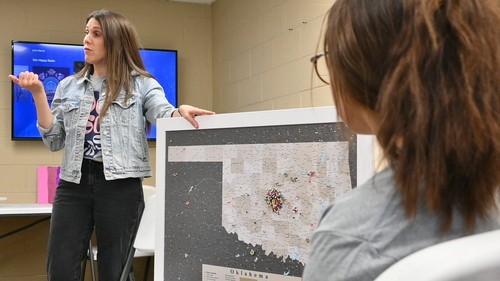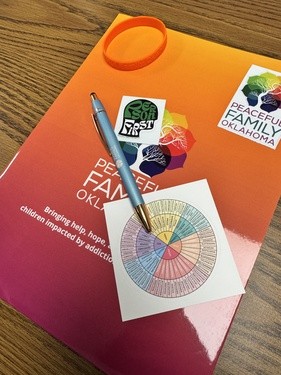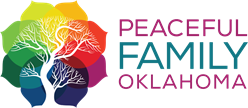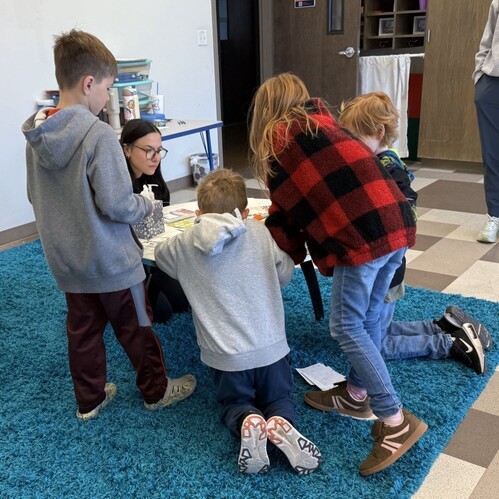Our Mission
Peaceful Family Oklahoma brings help, hope, and healing to children impacted by addiction in their families.
Through a range of proven programs and family support initiatives, PFO plays a crucial role in enabling children to flourish and to break the cycle of addiction.
Who We Are
Peaceful Family Oklahoma (PFO) fills a critical gap in Oklahoma’s behavioral health and recovery systems—providing the only statewide, child-centered response to family addiction. We equip children with skills that reduce their long-term risk of addiction, school failure, and justice involvement—ultimately saving systems money while changing lives. Founded in 2014 by a grandpa seeking services for his grandchildren
Our peer-to-peer model is what sets us apart—children connect with others who have been through similar experiences, helping them realize they are not alone and it is not their fault. We stay responsive by continuously updating our curriculum to address five urgent challenges affecting kids today:
All PFO programs are offered at no cost to families, removing financial barriers and helping overcome the stigma and shame that often prevent children from getting the support they need.
- $800K annual budget with less than 10% from public funds - Form 990
- Serving ~1,000 children each year
- Demand could triple if resources allowed
Our peer-to-peer model is what sets us apart—children connect with others who have been through similar experiences, helping them realize they are not alone and it is not their fault. We stay responsive by continuously updating our curriculum to address five urgent challenges affecting kids today:
- the fentanyl crisis
- the fourth wave of the opioid epidemic
- mental health effects of the pandemic
- increased vaping and THC use
- emerging brain research around the impact of medical marijuana on youth.
All PFO programs are offered at no cost to families, removing financial barriers and helping overcome the stigma and shame that often prevent children from getting the support they need.
Why This Matters
Addiction affects the whole family, but most recovery programs focus on adults. Children are often left without support. That’s where we come in.
Key Facts:
Early intervention with children reduces the need for costlier services later—such as juvenile justice, special education, and long-term behavioral health treatment.
Key Facts:
- 1 in 4 Oklahoma children are impacted by addiction in their families
- They are 8x more likely to become addicted themselves
- They are 2x more likely to repeat a grade, and 3x more likely to be suspended
- Nearly 70% of child welfare removals in OK involve substance use as a contributing factor
Early intervention with children reduces the need for costlier services later—such as juvenile justice, special education, and long-term behavioral health treatment.

What We Do
Children’s & Teen Day Camps (Ages 7–12 and 13–18)
Therapeutic camps that help participants understand addiction, practice coping skills, and build resilience through expressive, evidence-based activities.
Therapeutic camps that help participants understand addiction, practice coping skills, and build resilience through expressive, evidence-based activities.
School-Based Programs (Pre-K–12)
Curriculum aligned with Oklahoma Academic Standards for Health that builds emotional regulation, social awareness, and peer connection. PFO supports schools in meeting mandated health standards while addressing behavioral factors that affect student performance and classroom stability.
Curriculum aligned with Oklahoma Academic Standards for Health that builds emotional regulation, social awareness, and peer connection. PFO supports schools in meeting mandated health standards while addressing behavioral factors that affect student performance and classroom stability.
Family Support Groups
Ongoing support for children and caregivers who have participated in PFO programming, offered through trauma-informed groups, playdates, and virtual sessions to sustain progress and reinforce protective relationships.
Ongoing support for children and caregivers who have participated in PFO programming, offered through trauma-informed groups, playdates, and virtual sessions to sustain progress and reinforce protective relationships.
Community-Based Interventions (Emerging)
This initiative is in early development, driven by rising demand from professionals who regularly interact with children affected by addiction. They want practical tools to respond effectively when a child is struggling—and we are answering that call. Grounded in research on Adverse Childhood Experiences (ACEs) and Protective and Compensatory Experiences (PACEs), the goal is to expand the number of stable, trained adults positioned to intervene early and reduce long-term harm. This initiative also addresses a critical workforce gap by preparing educators, healthcare staff, and youth workers to respond confidently in real-world situations. With strategic investment, we can strengthen frontline systems and scale impact.
This initiative is in early development, driven by rising demand from professionals who regularly interact with children affected by addiction. They want practical tools to respond effectively when a child is struggling—and we are answering that call. Grounded in research on Adverse Childhood Experiences (ACEs) and Protective and Compensatory Experiences (PACEs), the goal is to expand the number of stable, trained adults positioned to intervene early and reduce long-term harm. This initiative also addresses a critical workforce gap by preparing educators, healthcare staff, and youth workers to respond confidently in real-world situations. With strategic investment, we can strengthen frontline systems and scale impact.
Expanding Access Through Key Partnerships
In 2024, we began embedding programs where children already are, removing barriers to access:
Cleveland County – Norman Public Schools: Age-appropriate school modules delivered on campus, reaching students where they are. Nearly 80% of children access mental health support through schools.
Oklahoma County – Comeback Kid Society and Pivot: Trauma-informed programming in foster group homes to help children in care build safety, trust, and emotional strength.
Canadian County – Cardinal Point Family Justice Center: Embedded services for families navigating domestic violence, trauma, and addiction—ensuring immediate connection to support.
Measuring What Matters
We use evidence-based tools to track measurable gains in:
- Knowledge of Addiction
- Emotional and Behavioral Skills
- Protective Relationships
- Risk Reduction
- Long-Term Resilience
- Looking Ahead

With current resources, we reach 1,000 children annually. We are equipped to scale—and demand already supports tripling that number. Strategic investment now will multiply impact, strengthen community systems, and reduce downstream costs across public services.
We’re not just helping kids. We’re building a smarter, stronger, more responsive system for Oklahoma’s future.
We’re not just helping kids. We’re building a smarter, stronger, more responsive system for Oklahoma’s future.

